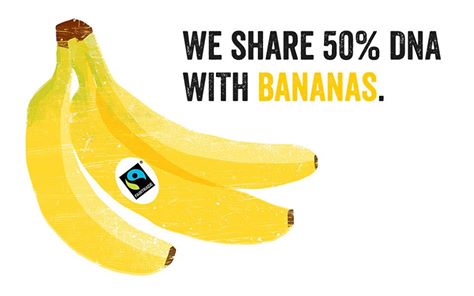Met het oog op Barry Callebaut’s open invitatie (waar ik volgens Nick niet onderuit zal kunnen) vandaag iets over de cruciale rol van vakbonden én – jawel! – het Fairtradekeurmerk in het menselijke en economische succes van de Ghanese Fairtrade fruitsector.
Het wekelijks verschijnende Britse retailmagazine The Grocer schreef een zeer uitgebreid verslag over de reis die Banana Link organiseerde, om een kijkje te nemen op de Fairtrade gecertificeerde bananenplantages in Ghana.
Banana Link nam het artikel over. Enkele pakkende (en enigszins hoopgevende) citaten, ook met het oog op verbetering van de positie van de cacaoboeren in het West-Afrikaanse land:
[…] the current enthusiasm of Aldi and Lidl for Rainforest Alliance certification has invited suspicion that the scheme’s appeal to them lies in the relative laxity of its certification criteria and its attractive affordability.
Pressure to keep retail prices for loose bananas as low as possible creates an unhelpful climate.
Ghana, which currently supplies Sainsbury’s, M&S, and the Co-op in the UK, is living proof that commercial Fairtrade banana and pineapple growing on plantations can be both ethical and sustainable. This is why Make Fruit Fair – an EC-funded alliance of international NGOs, unions, and small farmer organisations that aim to improve conditions for people who grow, pick and pack our tropical fruit – hails Ghana as a model for best practice in the global fruit industry.
Of course, the benefits that Fairtrade brings to fruit producers worldwide (crucially, the guaranteed minimum price and social premium), are well documented. But in Ghana, it really feels as if Fairtrade has gone up a gear – well beyond any tokenistic, feelgood box-ticking of standards – embedding more ambitious labour rights and environmental goals in daily practice.
Certification is only a framework. It relies on audits, snapshots taken over a day or two. If you speak to workers in other countries they tell you they know when auditors are coming because they suddenly get safety equipment. Without unions on the ground enabling workers to actually get what they’re entitled to, auditing can almost become a game.
To understand what’s been happening in Ghana’s blossoming Fairtrade fruit sector, you must appreciate the country’s uniqueness. It was the first African country to gain independence. Its first leader, Kwame Nkrumah, was helped to power by trade unions, and they have been partners in a collaborative dialogue with government and fruit companies ever since. Ghana has signed up to the International Labour Office’s conventions, and ratified all eight of them, committing to freedom of association and collective bargaining, and these conventions are enforced and respected on the ground. On Ghanaian banana and pineapple plantations, 100% of non-management workers are unionised, yet ironically strikes are rare in Ghana, and confined to workplaces that lack a union. Contrast this harmonious situation with Peru, where there are anti-union laws and frequent violations of labour rights, or Guatemala, where being an active plantation trade unionist puts you at risk of rape or death.
Readiness to pay more for Fairtrade fruits depends on shoppers hearing a credible, evidenced assurance that the scheme isn’t just another badge on a box. And though Ghana is a poor country, its emerging status as the truest, most whole-hearted expression of Fairtrade principles in operation worldwide obviously makes it a winner with ethical consumers. Food miles are not irrelevant either. Ghana is on the same latitude as the UK, and along with Cameroon, our closest banana and pineapple supplier.
